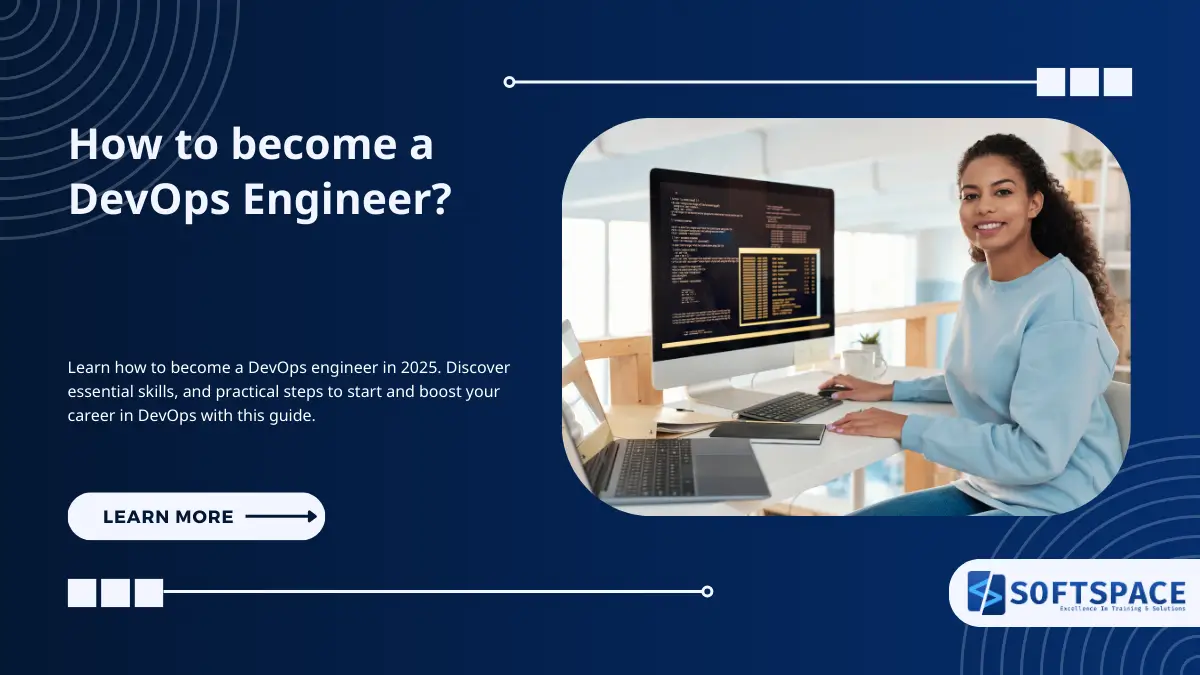The role of a DevOps engineer has become one of the most sought-after positions in the IT industry. As organizations increasingly adopt cloud computing, automation, and continuous integration/continuous delivery (CI/CD) practices, the demand for skilled DevOps professionals continues to grow.
By 2025, the DevOps culture will be an integral part of software development and IT operations, making it a lucrative and rewarding career path. This report provides a detailed roadmap for aspiring DevOps engineers, outlining the necessary skills, tools, certifications, and career strategies based on insights from trusted sources. So, let us give you some information which can help in deciding How to Become a DevOps Engineer.

What is DevOps?
DevOps is a set of practices, tools, and cultural philosophies aimed at improving the collaboration and communication between software development (Dev) and IT operations (Ops) teams. The goal of DevOps is to shorten the development lifecycle, improve the quality of software, and provide continuous delivery of applications and services.
Key aspects of DevOps include:
- Automation: Automating repetitive tasks such as testing, deployment, and infrastructure management to increase efficiency and reduce human error.
- Continuous Integration and Continuous Delivery (CI/CD): Ensuring that code changes are automatically tested, integrated into the main codebase, and delivered to production in small, manageable increments.
- Collaboration: Encouraging close collaboration between developers and operations teams to align goals, share responsibilities, and resolve issues more effectively.
- Monitoring and Feedback: Continuously monitoring the application and infrastructure performance in real-time to quickly identify and address potential issues.
- Infrastructure as Code (IaC): Managing and provisioning infrastructure using code, making it easier to replicate and scale environments.
With DevOps expertise, organisations can deliver software faster, more reliably, and with fewer errors. It also supports the creation of a culture of continuous improvement and innovation.
What does a DevOps Engineer do?
A DevOps Engineer plays a crucial role in bridging the gap between software development and IT operations. Their main goal is to streamline and automate the processes involved in software development, deployment, and operations to improve efficiency, collaboration, and the quality of the software delivered. Here are some key responsibilities of a DevOps Engineer:
- Automation of Workflows:
- Automating tasks such as testing, code integration, deployment, and infrastructure management to reduce manual effort and errors.
- Continuous Integration and Continuous Deployment (CI/CD):
- Setting up and maintaining CI/CD pipelines, ensuring that code changes are automatically tested, integrated, and deployed to production with minimal manual intervention.
- Infrastructure Management:
- Managing cloud infrastructure (e.g., AWS, Azure, Google Cloud) using tools like Terraform or CloudFormation.
- Implementing Infrastructure as Code (IaC) to provision and configure servers, networks, and storage automatically.
- Monitoring and Logging:
- Implementing monitoring tools (e.g., Prometheus, Nagios, ELK stack) to track system performance, identify bottlenecks, and resolve issues before they affect users.
- Ensuring real-time logging to understand application behaviour and performance.
- Collaboration Between Teams:
- Working closely with developers, quality assurance (QA) teams, and operations teams to ensure smooth communication and quick resolution of issues.
- Helping both developers and IT operations teams understand and implement the best practices for DevOps.
- Performance Optimization:
- Ensuring that systems are optimized for high availability, scalability, and security.
- Identifying performance issues and suggesting solutions to improve the overall system’s efficiency.
- Security Implementation:
- Integrating security practices (often referred to as DevSecOps) into the DevOps pipeline, ensuring that security is part of the continuous integration and deployment process.
A DevOps Engineer essentially focuses on improving the speed and quality of software releases, managing system infrastructure efficiently, and ensuring that everything works seamlessly from development to production.
DevOps Engineer Salary in India
The salary of a DevOps Engineer in India varies widely, ranging from ₹3.8 lakhs to ₹56 lakhs per year, depending on experience and the employer. Here’s an overview of salary ranges by experience level:
- Junior DevOps Engineer: ₹4 lakhs–₹7 lakhs per year
- DevOps Engineer: ₹5 lakhs–₹14 lakhs per year
- Senior DevOps Engineer: ₹11 lakhs–₹26 lakhs per year
- Lead DevOps Engineer: ₹12 lakhs–₹39 lakhs per year
Top-paying companies include Simplimadly, Deutsche Bank, ANZ Operations & Technology, Salesforce, and Zeta.
Top-paying industries are Internet, Software Products, Financial Services, and Telecom sectors.
How to become a DevOps Engineer step-by-step?
1. Build a Strong Foundation in DevOps Culture
Understanding the principles of DevOps is crucial. DevOps emphasizes collaboration, iterative feedback, and continuous improvement. Agile methodologies and practices, such as Scrum and Kanban, influence the DevOps culture (Coursera, 2024).
2. Learn Operating Systems and System Administration
A solid understanding of Linux/Unix systems is essential for DevOps engineers. Over 90% of public cloud workloads run on Linux (DevOpsCube, 2024). Key skills include:
- Managing server configurations.
- Using shell scripting and command-line tools.
- Understanding various Linux distributions like Ubuntu, CentOS, and RHEL.
3. Master Programming and Scripting Languages
Programming and scripting are fundamental for automating tasks and building infrastructure-as-code solutions. The most recommended languages for DevOps engineers in 2025 include:
- Python: Known for its versatility and vast libraries, Python is widely used for automation, scripting, and managing infrastructure (StarAgile, 2025).
- Bash: Essential for writing shell scripts.
- Go: Increasingly popular for cloud-native development.
- Ruby: Often used in configuration management tools like Chef (Index.dev, 2024).
4. Gain Expertise in Infrastructure as Code (IaC)
IaC tools automate the provisioning and configuration of infrastructure, making them indispensable for DevOps engineers. Popular IaC tools include:
- Terraform: Used for managing cloud infrastructure.
- Ansible: Simplifies configuration management and application deployment.
- Chef and Puppet: Automate server configuration (Zero to Mastery, 2025).
5. Learn CI/CD Tools
Continuous integration and continuous delivery (CI/CD) pipelines are at the heart of DevOps. Familiarity with CI/CD tools is critical for automating build, test, and deployment processes. Key tools include:
- Jenkins: A widely used open-source automation server.
- GitLab CI/CD: Integrated with version control for seamless workflows.
- Bamboo: Ideal for enterprise-level CI/CD (Roadmap.sh, 2025).
6. Master Containerization and Orchestration
Containerization technologies like Docker and orchestration tools like Kubernetes are essential for deploying and managing scalable applications. These tools allow DevOps engineers to package applications with their dependencies, ensuring consistency across environments (GeeksforGeeks, 2024).
7. Develop Cloud Computing Expertise
Cloud platforms like AWS, Google Cloud, and Microsoft Azure are integral to modern DevOps practices. DevOps engineers must understand:
- Cloud architecture and services.
- Managing scalable infrastructure.
- Serverless computing and edge computing (Own Petz, 2024).
8. Focus on Security (DevSecOps)
Security is a critical aspect of DevOps. DevSecOps integrates security practices into every phase of the software lifecycle. Key practices include:
- Automated compliance checks.
- Secure code deployment.
- Monitoring and incident response (Roadmap.sh, 2025).
9. Obtain Relevant Certifications
Certifications validate your skills and enhance employability. Recommended certifications for DevOps engineers include:
- AWS Certified DevOps Engineer.
- Certified Kubernetes Administrator (CKA).
- Docker Certified Associate.
- HashiCorp Certified: Terraform Associate (DevOpsCube, 2024).
10. Gain Hands-On Experience
Practical experience is invaluable. Start by working on small projects, contributing to open-source initiatives, or interning in DevOps roles. Building a portfolio of real-world projects will demonstrate your skills to potential employers (Zero to Mastery, 2025).
How to Become a DevOps Engineer with Top-rated DevOps Courses?
- DevOps Engineering – Planning to Production [GeeksforGeeks]
- Google Professional Cloud DevOps Engineer [Google]
- Continuous Delivery & DevOps [Coursera]
- AWS Certified DevOps Engineer Professional
- Decoding DevOps with Projects [Udemy]
- DevOps Culture and Mindset [Coursera]
- Microsoft Certified: DevOps Engineer Expert [Microsoft]
- DevOps: The Big Picture [Pluralsight]
Future Trends and Skills for DevOps Engineers in 2025
To stay competitive in the evolving DevOps landscape, focus on acquiring advanced skills and staying updated with industry trends:
- AI and Automation: AI tools are transforming DevOps by automating monitoring, incident response, and system optimization.
- Serverless Architectures: Reducing the need for managing physical servers.
- Edge Computing: Optimizing resources closer to the data source for low-latency processing.
Conclusion
Becoming a DevOps engineer in 2025 is a rewarding career path with ample growth opportunities. By mastering core skills, gaining hands-on experience, and staying current with industry trends, you can secure a successful and well-compensated position in this dynamic field. Start your journey today by following the roadmap outlined in this guide.

Content Strategist | AI Tools Practitioner | Career & Study Abroad Consultant
Sagar Hedau is a content strategist and AI tools practitioner based in Nagpur, India. With 13+ years of experience in career counselling and psychometry, he now works at the intersection of content strategy and no-code AI technology, using tools like Claude, Lovable, LovArt, and Notion AI in his daily workflow. He writes to make AI genuinely accessible for non-technical professionals, students, and business owners who want to build and automate without coding. He also runs an active career counselling practice, helping individuals navigate career decisions with data-backed psychometric analysis.
🌐 sagarhedau.com | 💼 LinkedIn

